Lusha Alternatives: 12 Contact Finding Tools for 2025
Different options beyond Lusha: How various contact enrichment platforms approach data access, verification, and pricing
Blogby JanMay 21, 2025

Exploring Lusha alternatives can help sales and marketing teams find contact enrichment solutions that align with their specific requirements. While Lusha has gained popularity for its straightforward Chrome extension and contact finding capabilities, the B2B data landscape offers a diverse range of platforms with different strengths, specializations, and pricing models. This comprehensive guide examines the ecosystem of contact finder tools to help you identify which platform best addresses your organization's unique prospecting needs.
This analysis goes beyond feature comparisons to examine the fundamental differences in how each platform approaches data collection, verification, and delivery. We'll highlight how different solutions excel for various team sizes, target markets, and use cases, so you can confidently select a contact enrichment tool that provides the optimal match for your specific requirements.
Understanding Lusha: Features and Approach
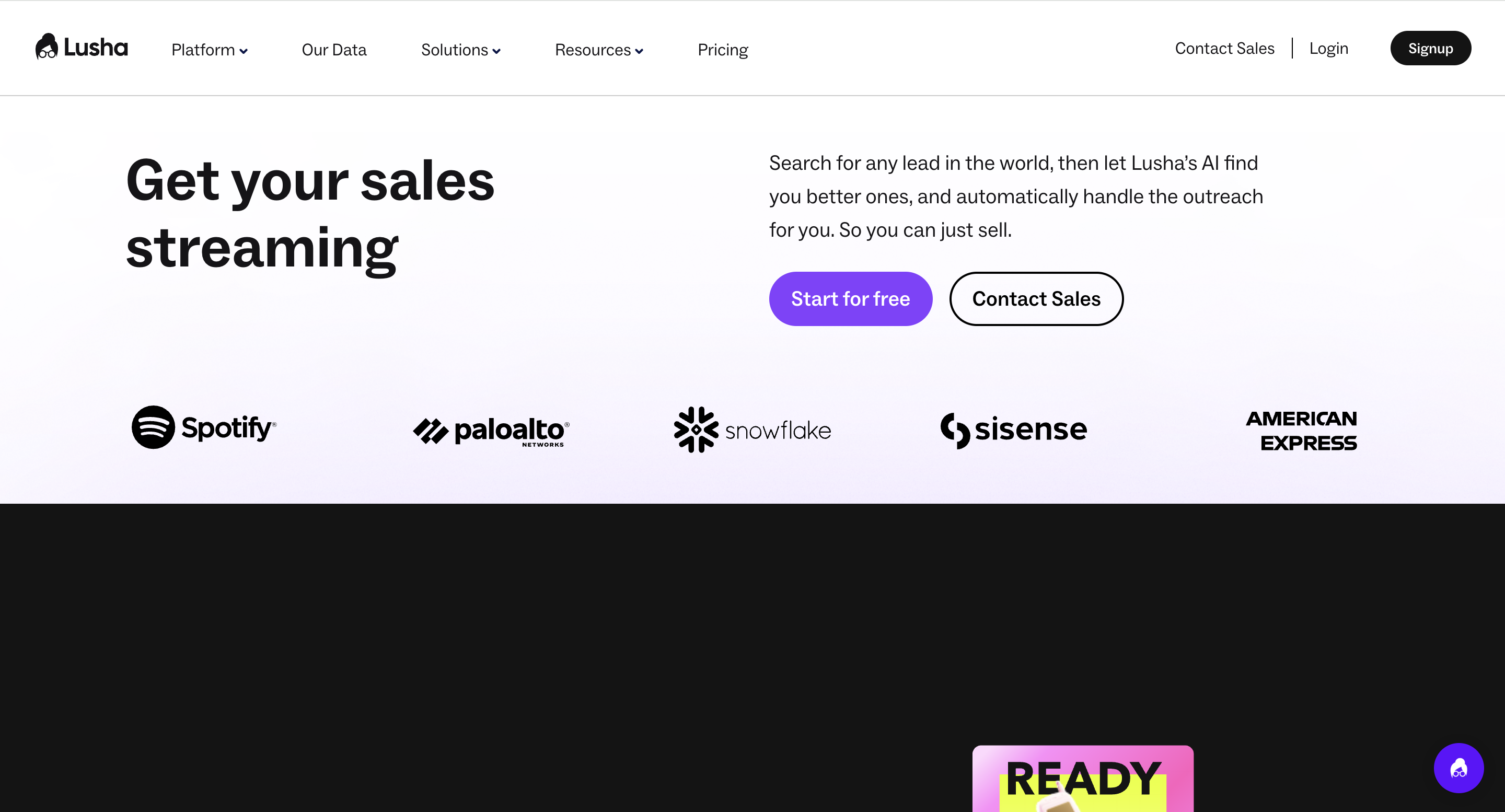
Before exploring alternatives, let's establish a clear understanding of Lusha's core offering and approach:
Lusha provides a popular contact finder tool primarily accessed through a Chrome extension, offering:
- Business email discovery
- Direct phone number lookup
- Basic company information
- LinkedIn integration via browser extension
- Credit-based pricing model
- Team collaboration features
Lusha works well for teams seeking a straightforward way to enrich individual contacts while browsing LinkedIn or company websites. Its browser extension makes finding contact information quick and convenient, while its credit-based system provides flexibility for occasional users.
When Different Approaches Might Better Fit Your Needs
Different organizations have unique requirements that might make alternative approaches worth exploring:
Different Feature Preferences
Some teams may benefit from capabilities that focus on areas beyond Lusha's core strengths:
- Comprehensive company data: Organizations focusing on account intelligence and firmographics
- Multi-source verification: Teams prioritizing maximum email verification confidence
- Bulk processing: Companies working with large contact lists regularly
- Advanced filtering: Organizations with highly specific targeting parameters
- Data customization: Teams wanting to build tailored data workflows
Alternative Pricing Approaches
Different pricing models might better align with certain usage patterns:
- Subscription-based: Teams preferring consistent monthly costs
- High-volume access: Organizations with extensive prospecting activities
- Flexible consumption: Teams with irregular usage patterns
- Feature-inclusive tiers: Organizations wanting access to all capabilities
- Team-wide options: Companies with many occasional users
Specialized Data Coverage
Different target markets benefit from platforms with varying data strengths:
- International focus: Organizations targeting markets outside North America
- Industry specialization: Teams focusing on specific vertical markets
- Technical talent: Companies primarily recruiting developers and engineering roles
- Small business data: Organizations prospecting SMB markets
- Executive access: Teams prioritizing C-suite connections
Different Integration Needs
Your existing tech stack may influence which approach works best:
- CRM ecosystem: Organizations heavily invested in specific CRM platforms
- Marketing automation: Teams wanting connections to marketing platforms
- Custom application needs: Companies with proprietary systems
- Data export flexibility: Organizations concerned about portability
- Workflow automation: Teams building complex data processes
Various Compliance Requirements
Regulatory considerations affect contact data decisions:
- GDPR documentation: European operations with specific compliance needs
- Data source transparency: Organizations in regulated industries
- Consent management: Teams with strict privacy protocols
- Data residency: Companies with geographic restrictions on data storage
- Audit capabilities: Organizations needing to demonstrate compliance
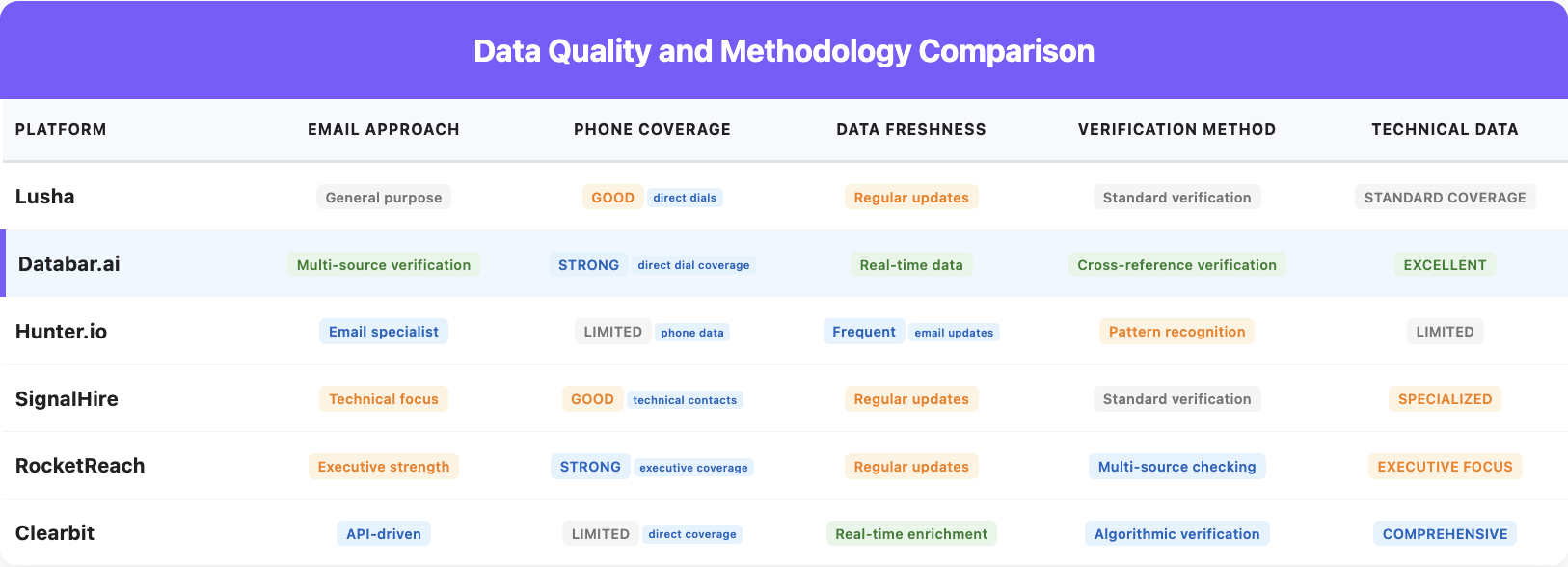
Key Evaluation Criteria for Contact Data Tools
When assessing different contact platforms, focus on these five critical factors:
Contact Information Quality
The fundamental value of any contact platform lies in its data. Effective b2b contact database solutions provide comprehensive coverage across industries and regions while maintaining verification accuracy.
- Email accuracy rates across your target industries
- Phone number coverage, particularly direct dials and mobiles
- Personal vs. role-based email balance
- Contact information freshness and update frequency
- Verification methodology and confidence scoring
Different platforms take various approaches to verification, resulting in different accuracy levels across regions and industries.
Browser Extension Experience
Since browser extensions are central to many contact finding workflows:
- Installation simplicity and browser compatibility
- User interface design and efficiency
- LinkedIn integration quality and reliability
- Additional platforms supported beyond LinkedIn
- Data display clarity and export options
The browser extension experience varies between platforms, affecting day-to-day usability for sales teams.
Pricing Structure Alignment
Consider how different pricing models align with your usage:
- Credit-based vs. subscription approaches
- Per-seat vs. team-wide access
- Unlimited options availability
- Feature accessibility across pricing tiers
- Contract flexibility and commitment requirements
The ideal pricing structure depends on your team's size, usage patterns, and budget predictability needs.
Integration Ecosystem
Your contact enrichment tool should connect well with your existing stack:
- Native CRM integrations depth and bidirectionality
- Marketing platform connections quality
- API flexibility and documentation
- Webhook capabilities for custom workflows
- Data portability and export options
Look beyond the mere presence of integrations to evaluate their depth and reliability.
Data Privacy Framework
Growing regulations make compliance capabilities increasingly important:
- GDPR and CCPA documentation comprehensiveness
- Data source transparency and collection methods
- Compliance certifications relevant to your industry
- Security measures for contact data
- User consent management capabilities
The most suitable platform will align with your specific regulatory requirements and risk tolerance.
Top Lusha Alternatives in 2025
Based on our analysis, these platforms offer different approaches to contact data that may align with various organizational needs:
Databar.ai
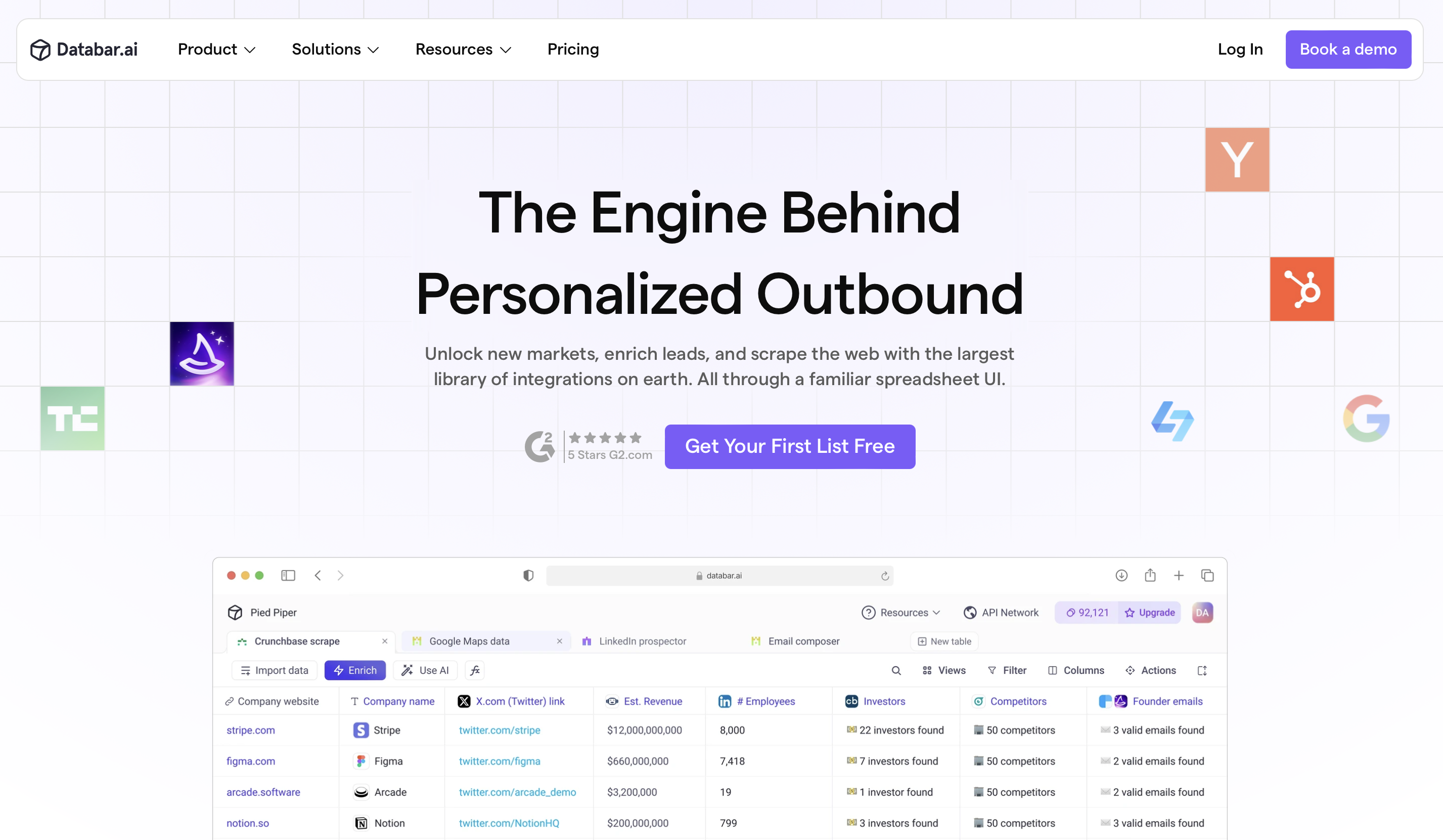
Databar.ai takes a multi-source approach to contact data by connecting users to over 90 specialized data providers through a single interface. This differs from Lusha's more unified database approach by providing access to multiple specialized data sources.
Key Characteristics:
- Multiple verification sources: Cross-references contact data across numerous providers
- Comprehensive company context: Detailed firmographic, technographic, and intent data
- Customizable workflows: Flexible data enrichment processes for different needs
- Subscription options: Alternative to credit-based consumption
- Chrome extension: Browser-based access to multiple data sources
- Deep CRM integration: Connections to major sales and marketing platforms
For teams looking to access multiple specialized data sources through a unified interface, Databar.ai offers an approach that emphasizes data breadth and customization.
Hunter.io
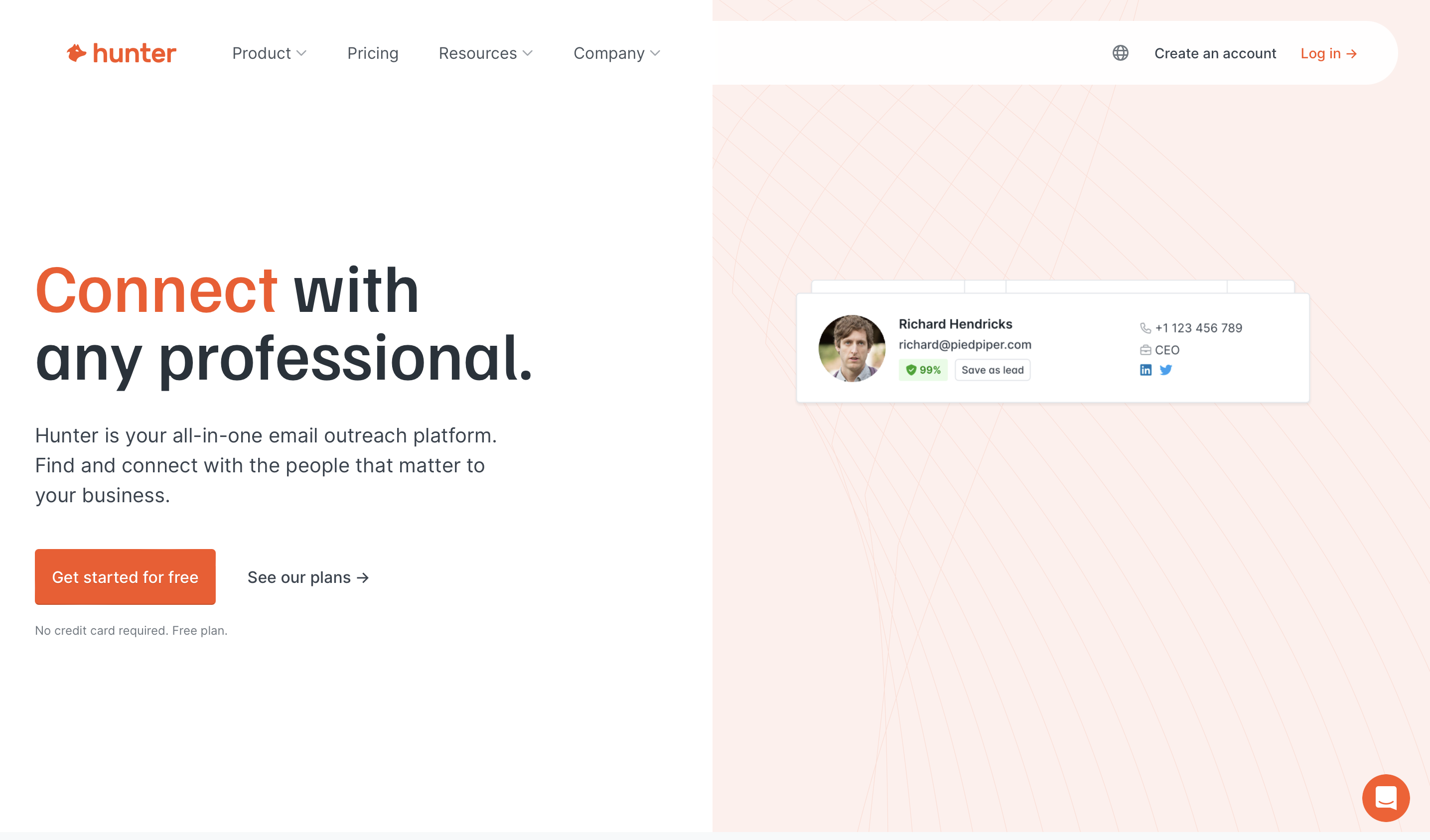
Hunter.io focuses specifically on email finding and verification with a specialized, streamlined approach.
Key Characteristics:
- Email verification focus: Specialized email verification technology
- Domain search: Pattern identification for company email formats
- Confidence scoring: Clear indication of email reliability
- Subscription model: Predictable monthly costs
- Simplicity: Focused, straightforward user experience
Organizations prioritizing email deliverability and domain-wide pattern discovery may find Hunter.io's specialized email approach aligns well with their specific needs.
➔ Get going with Hunter.io inside Databar.ai now using our native integration.
SignalHire
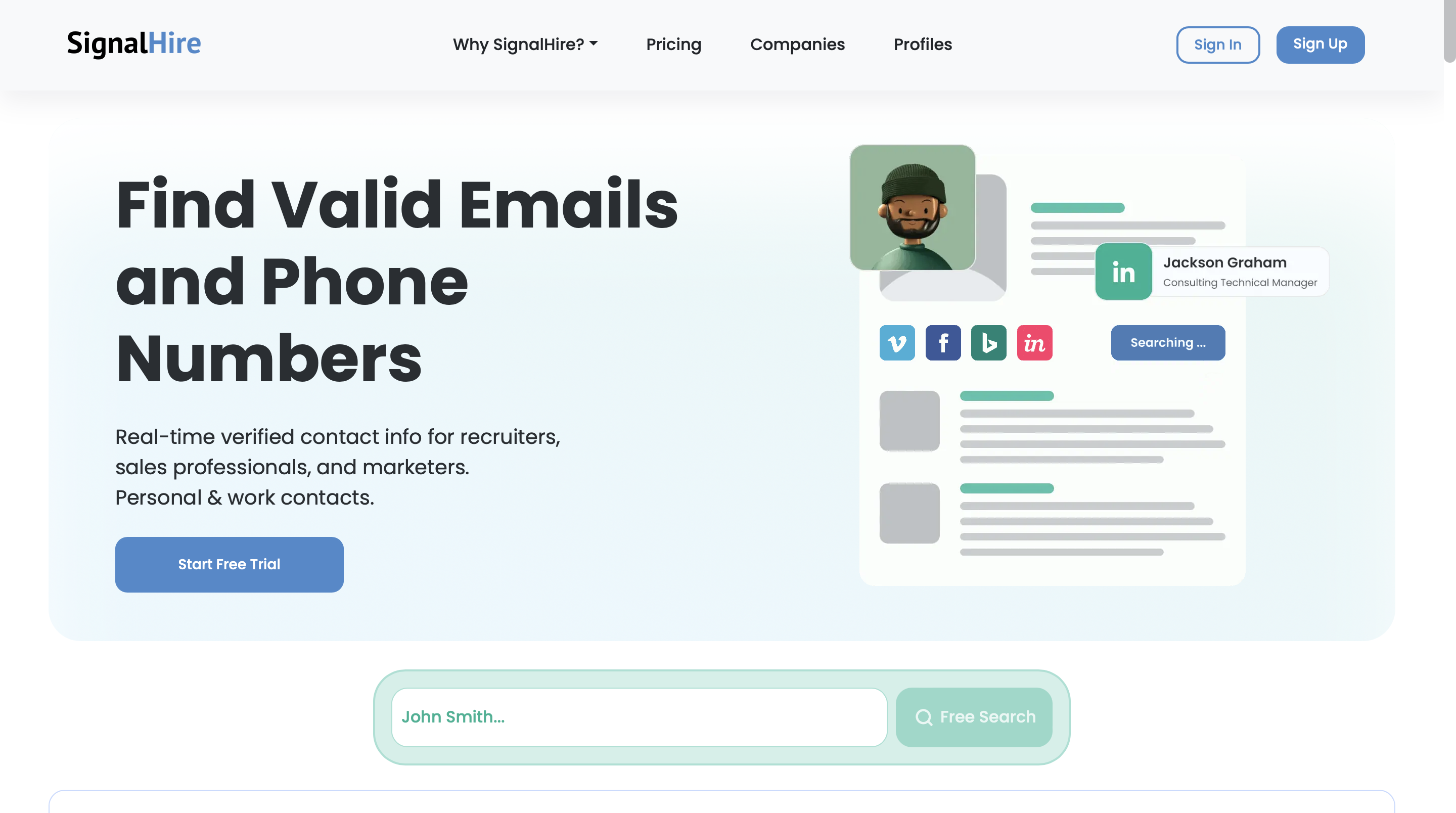
SignalHire specializes in technical talent discovery and multi-channel contact information.
Key Characteristics:
- Technical profiles: Strong data for software, IT, and engineering professionals
- Multi-platform extension: Works with LinkedIn, GitHub, Stack Overflow, and more
- Contact channel diversity: Provides personal email, work email, phone, and social profiles
- Developer focus: Specialized for technical recruiting
- Competitive pricing: Structured for regular technical recruiting needs
Recruiting teams and technology companies may find SignalHire's technical talent focus matches their specific requirements, particularly for developer and engineering roles.
RocketReach
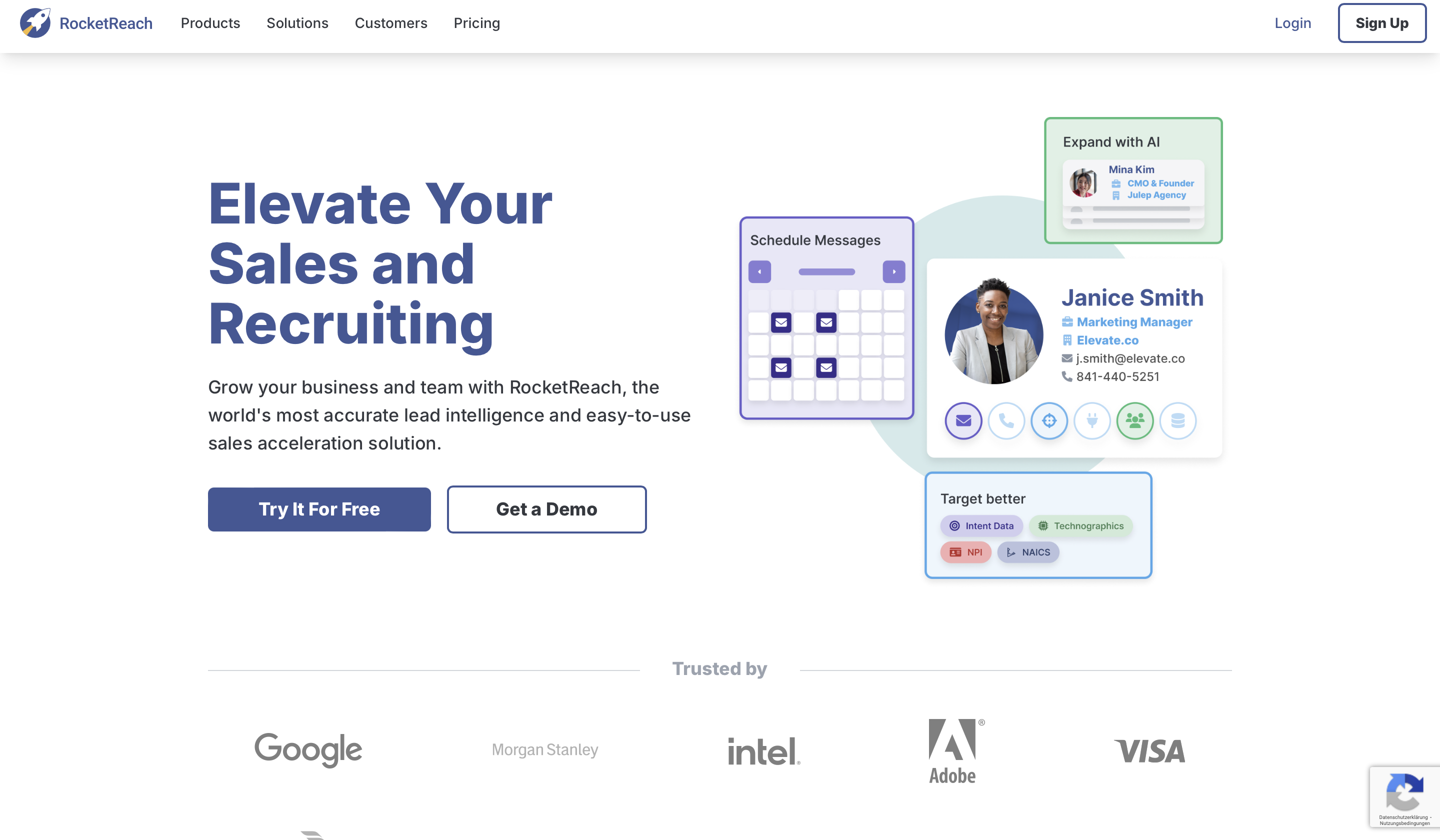
RocketReach specializes in comprehensive contact discovery with particular strength in executive contact information.
Key Characteristics:
- Executive coverage: Strong C-suite and leadership contact data
- Multiple contact methods: Direct dial, mobile, and email coverage
- Social profile mapping: Comprehensive social media discovery
- Bulk processing: Handles multiple contacts efficiently
- Advanced filtering: Sophisticated search parameters
Sales teams focusing on executive outreach may find RocketReach's leadership contact strength matches their senior-level prospecting requirements.
Clearbit
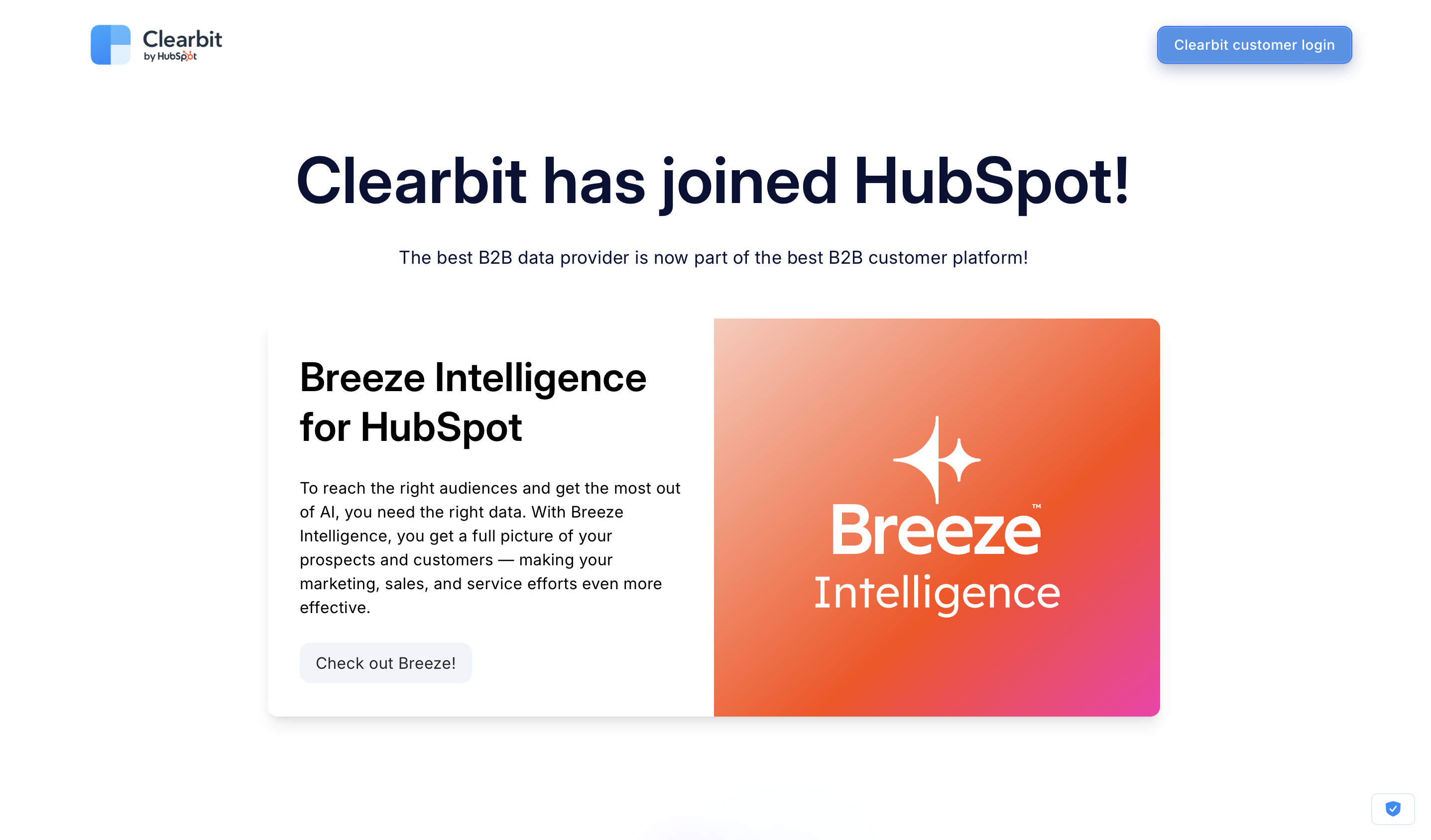
Clearbit offers data enrichment APIs and integrations focused on marketing and sales operations.
Key Characteristics:
- Real-time enrichment: Automatically enhances data as it enters systems
- Company intelligence: Comprehensive firmographic data
- API-first approach: Developer-friendly for custom implementations
- Marketing platform integration: Connections to marketing automation tools
- Reveal functionality: Identifies anonymous website visitors
Organizations with technical resources that need embedded enrichment capabilities may find Clearbit's API-first approach aligns with their systematic data enhancement requirements.
Snov.io
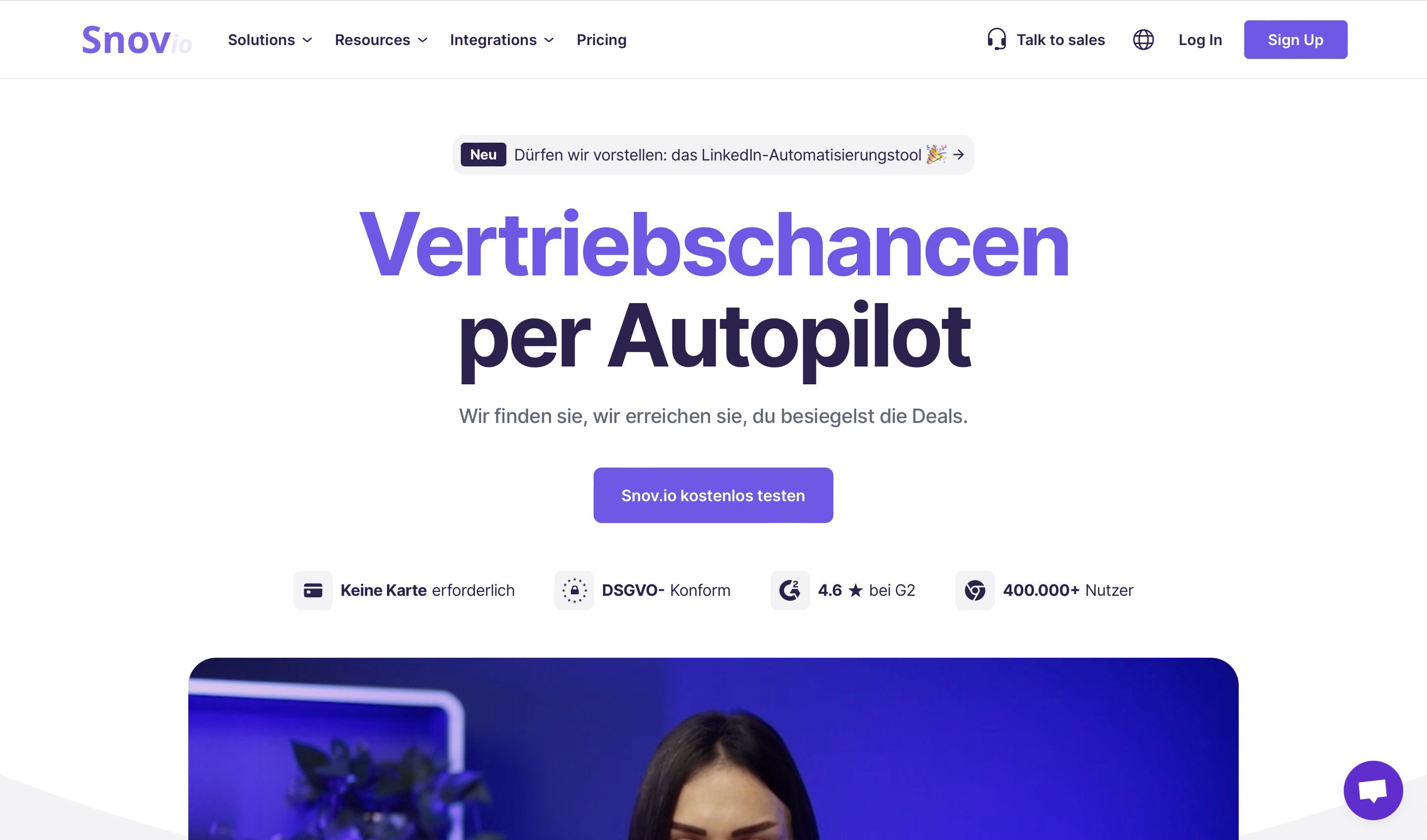
Snov.io offers a comprehensive suite of email-focused prospecting and verification tools at accessible price points.
Key Characteristics:
- Email finder: Professional email discovery tools
- Drip campaigns: Built-in email outreach capabilities
- Verification tools: Email validation technology
- Technology finder: Identifies companies using specific tools
- Affordable pricing: Entry-level plans starting under $50/month
Smaller teams looking for a comprehensive yet affordable platform often find Snov.io's straightforward yet feature-rich approach matches their budget and functionality requirements.
LeadIQ
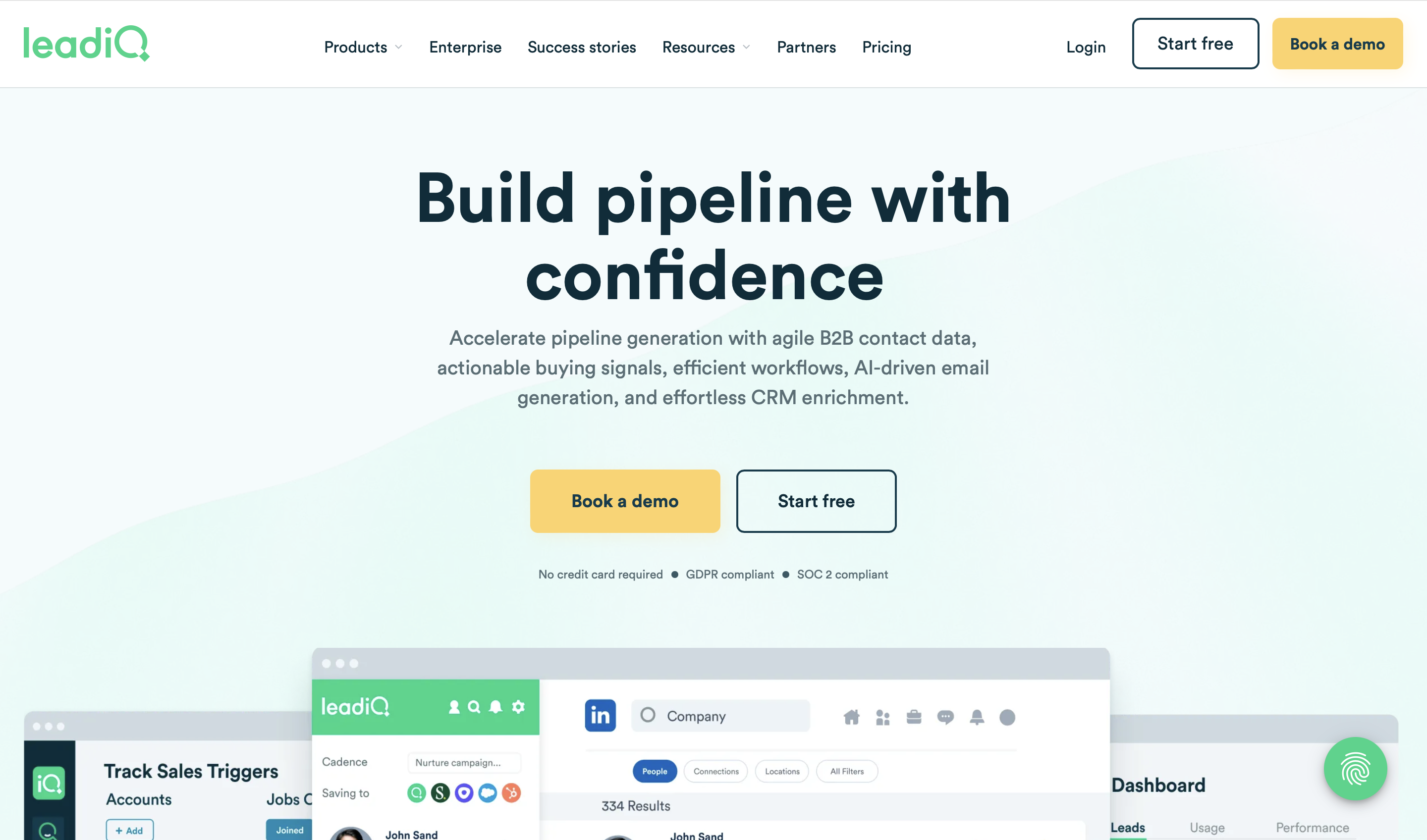
LeadIQ focuses on prospecting workflows with emphasis on CRM integration.
Key Characteristics:
- Chrome extension: LinkedIn prospecting capabilities
- CRM sync: Deep integration with Salesforce and other major CRMs
- Prospecting workflow: Designed for collaborative sales development
- Team collaboration: Sharing and workflow capabilities
- Smart recommendations: AI-powered contact suggestions
Sales development teams that heavily use LinkedIn for prospecting may find LeadIQ's CRM-integrated approach aligns well with their workflow requirements.
Apollo.io
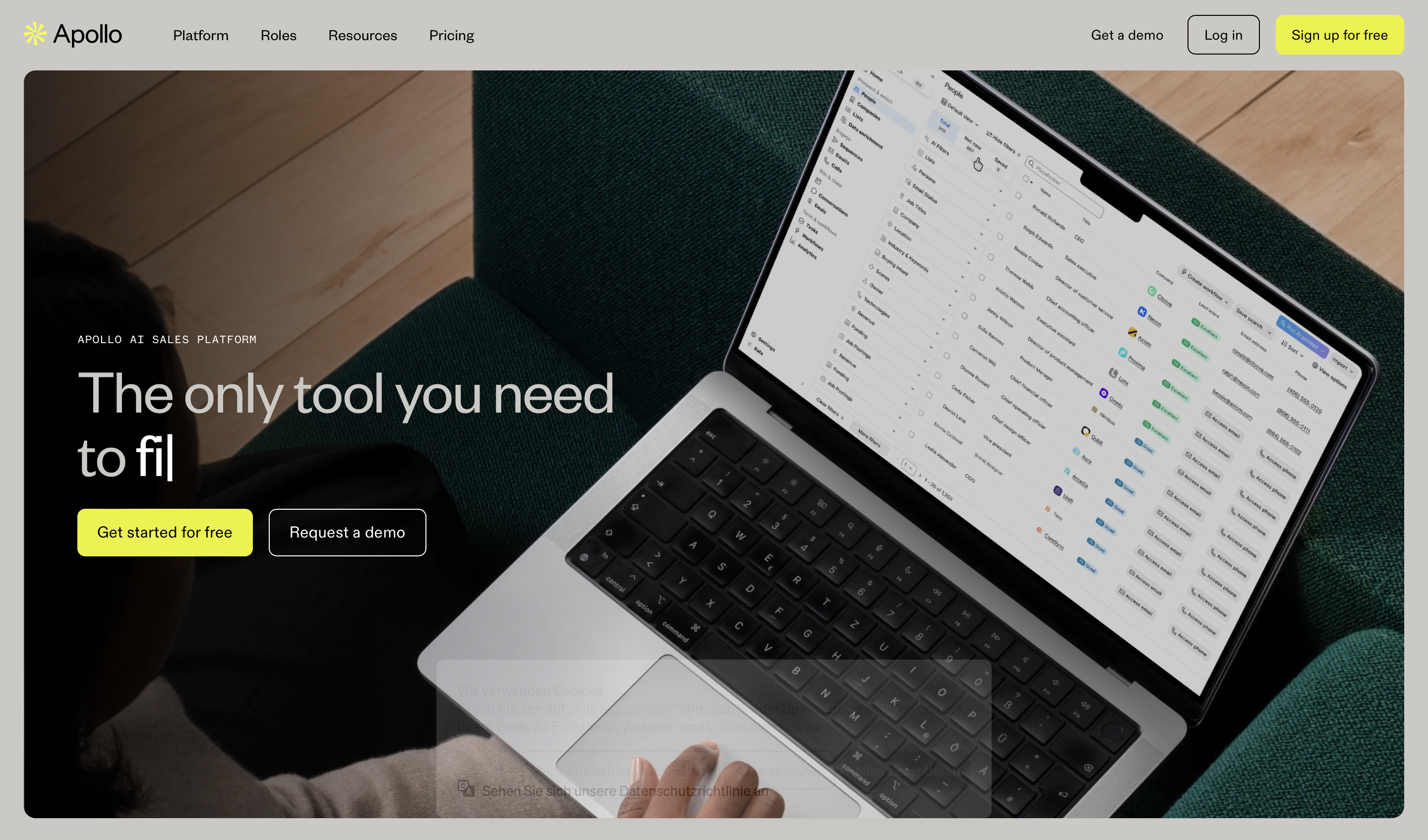
Apollo.io provides a comprehensive sales intelligence and engagement platform combining data with outreach capabilities.
Key Characteristics:
- Unified platform: Contact data, enrichment, and outreach in one solution
- Buyer intent data: Insights into prospect buying behavior
- Sequence functionality: Built-in email outreach capabilities
- Free tier available: Basic features accessible without payment
- Large database: Extensive contact coverage
Organizations seeking an all-in-one platform may find Apollo.io's combined data and engagement approach matches their need for integrated prospecting and outreach capabilities.
Seamless.AI
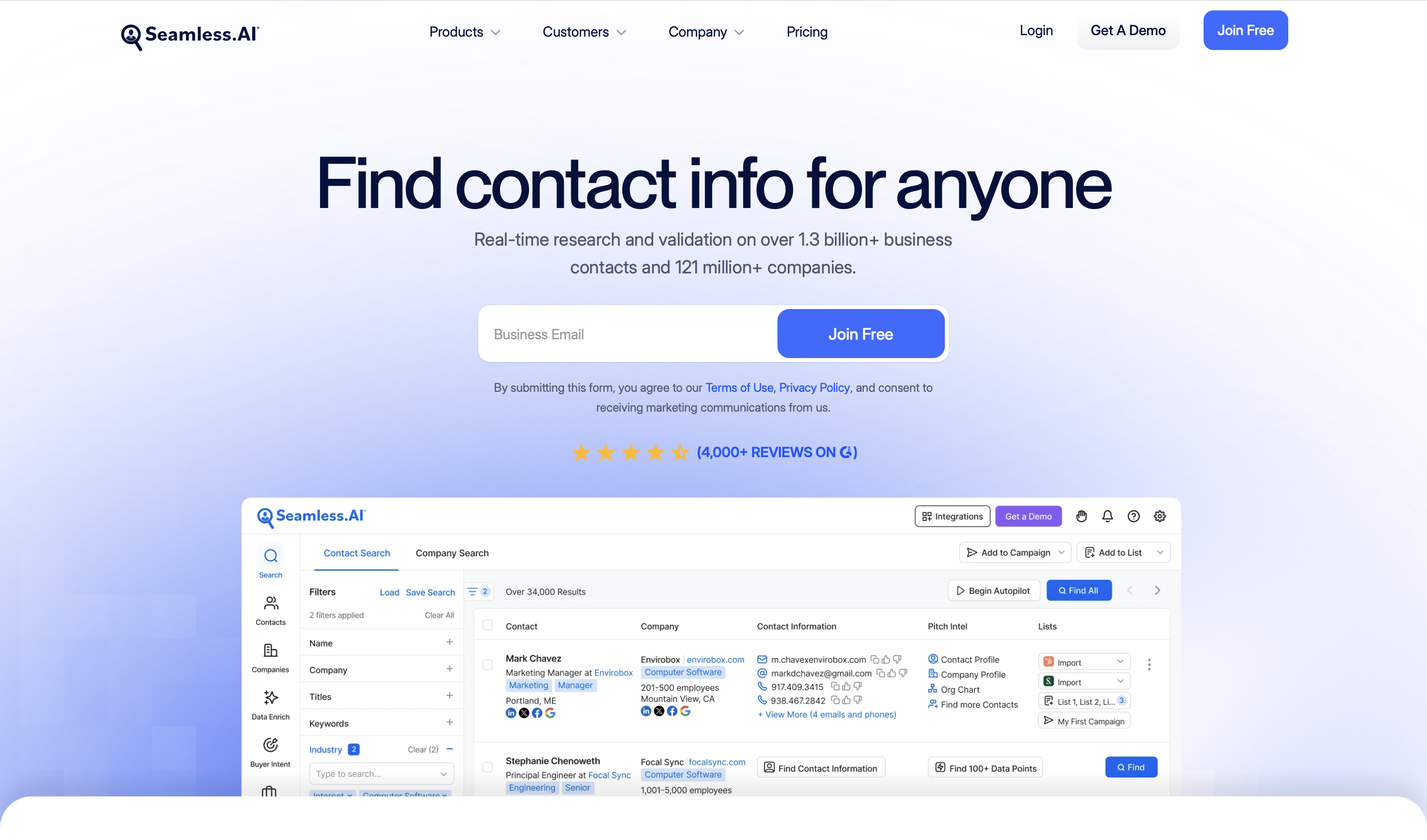
Seamless.AI takes an AI-powered approach to real-time contact discovery and verification.
Key Characteristics:
- Real-time verification: Checks data accuracy at the moment of use
- Unlimited searches: Fixed pricing with unlimited contact lookups on some plans
- Data accuracy guarantee: Credit replacement for inaccurate information
- List building automation: AI-powered target account identification
- Team collaboration: Sharing and workflow features
Organizations looking for unlimited contact access may find Seamless.AI's approach provides value for high-volume use cases.
Adapt.io
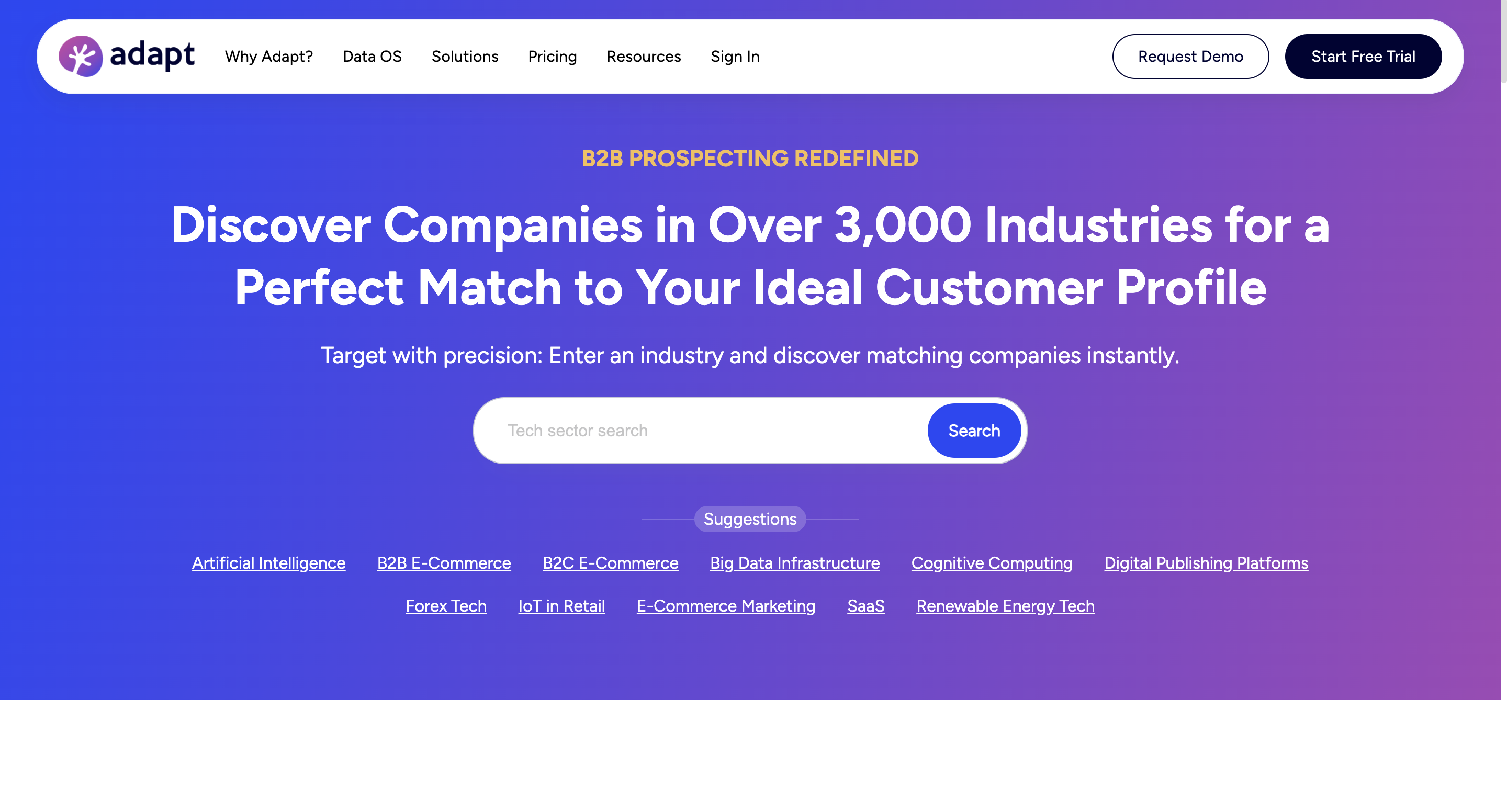
Adapt.io offers a comprehensive contact database with verification processes and competitive pricing.
Key Characteristics:
- Large database: Over 100 million contacts with regular updates
- Data verification: Multi-step accuracy process
- Search capabilities: Powerful filtering options
- Bulk processing: Efficient handling of large contact lists
- Competitive pricing: Structured for efficient scaling
Teams needing to process large contact lists may find Adapt.io's bulk capabilities and pricing structure suits their high-volume requirements.
ZoomInfo
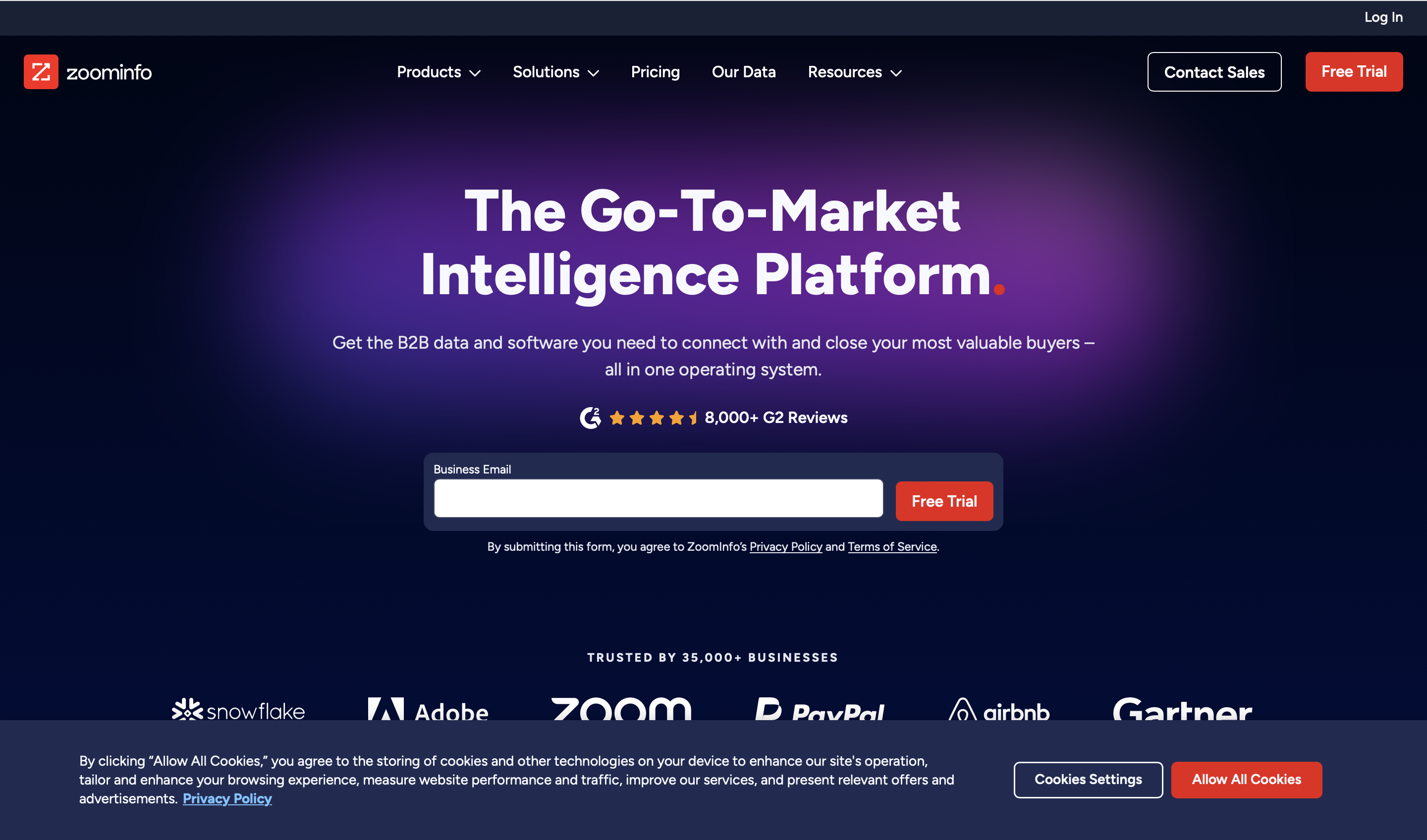
ZoomInfo positions itself as a premium enterprise-grade data platform with extensive verification processes.
Key Characteristics:
- Data accuracy: Comprehensive verification processes
- Detailed profiles: Extensive contact and company information
- Intent data: Buyer intent signals and monitoring
- Direct dial coverage: Extensive phone data
- Enterprise compliance: Robust documentation and features
Organizations with enterprise requirements and corresponding budgets may find ZoomInfo's premium approach aligns with their need for comprehensive data coverage.
LinkedIn Sales Navigator

While differing from direct contact finders, Sales Navigator offers an alternative approach focused on relationship-based prospecting.
Key Characteristics:
- First-party data: Information provided directly by professionals
- Relationship intelligence: Connection mapping and introduction paths
- InMail capabilities: Direct outreach within the platform
- Account targeting: Saved accounts and alert notifications
- Professional environment: High trust factor with prospects
Teams prioritizing relationship-based selling may find Sales Navigator's approach complements or offers an alternative to traditional contact finding methods.
Different Solutions for Different Needs
The ideal platform depends on your specific requirements and use cases:
For Teams with Diverse Data Requirements
Complementary Approaches: Databar.ai, ZoomInfo, RocketReach
Organizations with varied data needs often benefit from platforms offering comprehensive coverage across different data types. Databar.ai's multi-source approach provides access to specialized providers for different data categories, while ZoomInfo offers premium comprehensive data at higher price points. RocketReach provides particularly strong executive contact coverage for leadership-focused prospecting.
"We found that connecting to multiple specialized data sources through Databar.ai gave us the flexibility to access the right type of data for each of our different target markets, while maintaining a single platform for our team to learn and use." — Director of Sales Operations at a B2B SaaS company
For Organizations with Integration Priorities
Complementary Approaches: Databar.ai, Clearbit, LeadIQ
If your tech stack integration is a priority, these platforms offer different approaches to connectivity. Databar.ai provides straightforward integration with major CRMs and marketing platforms, while Clearbit's API-first approach enables custom implementations for technical teams. LeadIQ offers particularly deep Salesforce integration for sales development workflows.
For Companies with International Requirements
Complementary Approaches: Databar.ai, Adapt.io, Cognism
Organizations operating across diverse global markets often benefit from platforms with specialized international coverage. Databar.ai connects to regional data specialists in various markets, while Adapt.io maintains strong balanced global coverage. Cognism offers particularly strong European data with robust GDPR compliance features.
For Teams with Different Budget Considerations
Complementary Approaches: Databar.ai, Seamless.AI, Hunter.io
Different pricing models work better for different organization types and usage patterns. Databar.ai offers flexible consumption options, Seamless.AI provides unlimited models for high-volume users, and Hunter.io's specialized email focus comes with email-specific pricing that may provide efficiency for email-centric teams.
Making a Smooth Platform Transition
Switching contact platforms requires careful planning. Follow these steps for a smooth transition:
1. Document Your Current Usage
Before making any changes:
- Export your saved contacts and prospects
- Document your searches and filters
- Record your usage patterns and consumption
- Save any templates or snippets
- Note which team members are power users
This documentation ensures you maintain access to historical data during transition.
2. Define Your Requirements
Clearly establish what you need:
- Prioritize must-have features versus nice-to-haves
- Document specific data types most important to your team
- Identify integration requirements with existing systems
- Establish budget parameters and preferred pricing model
- Consider compliance and security requirements
Clear requirements help you evaluate alternatives against your specific needs rather than generic feature lists.
3. Evaluate Options with Actual Use Cases
Test potential platforms with your specific scenarios:
- Run comparison tests with the same contact set across platforms
- Compare match rates for your specific target industries
- Test browser extensions in your actual workflow
- Evaluate integration quality with your specific tech stack
- Calculate cost implications based on your actual usage patterns
Real-world testing reveals differences that feature comparisons might miss.
4. Implement in Phases
Roll out your chosen solution gradually:
- Start with a pilot team of power users
- Create documentation specific to your workflow
- Establish best practices before wider deployment
- Set clear success metrics for the transition
- Plan for potential data gaps during transition
Phased implementation minimizes disruption and allows for refinement.
5. Optimize Your Platform
Once implemented:
- Provide comprehensive training for all users
- Create internal documentation for common workflows
- Establish regular check-ins to address challenges
- Build relationships with the new vendor's support team
- Continuously refine processes to maximize value
Ongoing optimization ensures you realize the full potential of your chosen solution.
Conclusion: Finding Your Optimal Contact Data Solution
The B2B contact data landscape offers diverse platforms with different strengths, specializations, and approaches. While Lusha provides a straightforward contact finder that works well for many organizations, exploring alternatives can help you find a solution that particularly aligns with your specific requirements, whether they involve data coverage, pricing structure, or specialized capabilities.
For teams seeking access to multiple specialized data sources through a unified platform, Databar.ai offers a multi-source approach that connects to over 100 providers while maintaining an intuitive interface. Organizations prioritizing email verification might find Hunter.io's specialized focus valuable, while those targeting technical talent could benefit from SignalHire's developer-oriented approach.
The key to selecting the right platform isn't finding a universally "best" solution, but rather identifying which approach best addresses your specific needs, target markets, and usage patterns. By focusing on the criteria outlined in this guide, you can confidently select a contact enrichment solution that optimally aligns with your organization's unique requirements.
About Databar.ai
Databar.ai is a prospecting platform designed for efficient GTM workflow building. Our platform enables users to access data from 100+ providers, create custom enrichment workflows without coding, and automate personalized outreach—all through a single, intuitive interface.
Our multi-source approach connects you to specialized data providers across different regions and industries while maintaining a smooth user experience. This enables access to diverse contact and company information while our flexible pricing models accommodate different usage patterns. The result? More efficient campaigns, increased productivity, and optimized ROI on your contact data investment.
Contact finding accuracy depends on data sources and real-time verification. Before selecting Lusha alternatives, understanding multi-source capabilities becomes essential for optimizing contact discovery workflows. In case you're wondering how we compare to other products when evaluating contact enrichment solutions, here are in-depth comparisons:
- Our platform vs Clay - Leading multi-source data enrichment with 90+ specialized providers compared.
- Databar.ai's accessibility vs Clearbit - User-friendly contact discovery with flexible pricing versus API-first enterprise implementation approach.
- How our platform differs from SignalHire - Multi-source contact finding across diverse industries versus single data platform.
- Databar.ai vs DropContact - Complete contact intelligence through multiple data types versus focused email enrichment platform.
Related articles
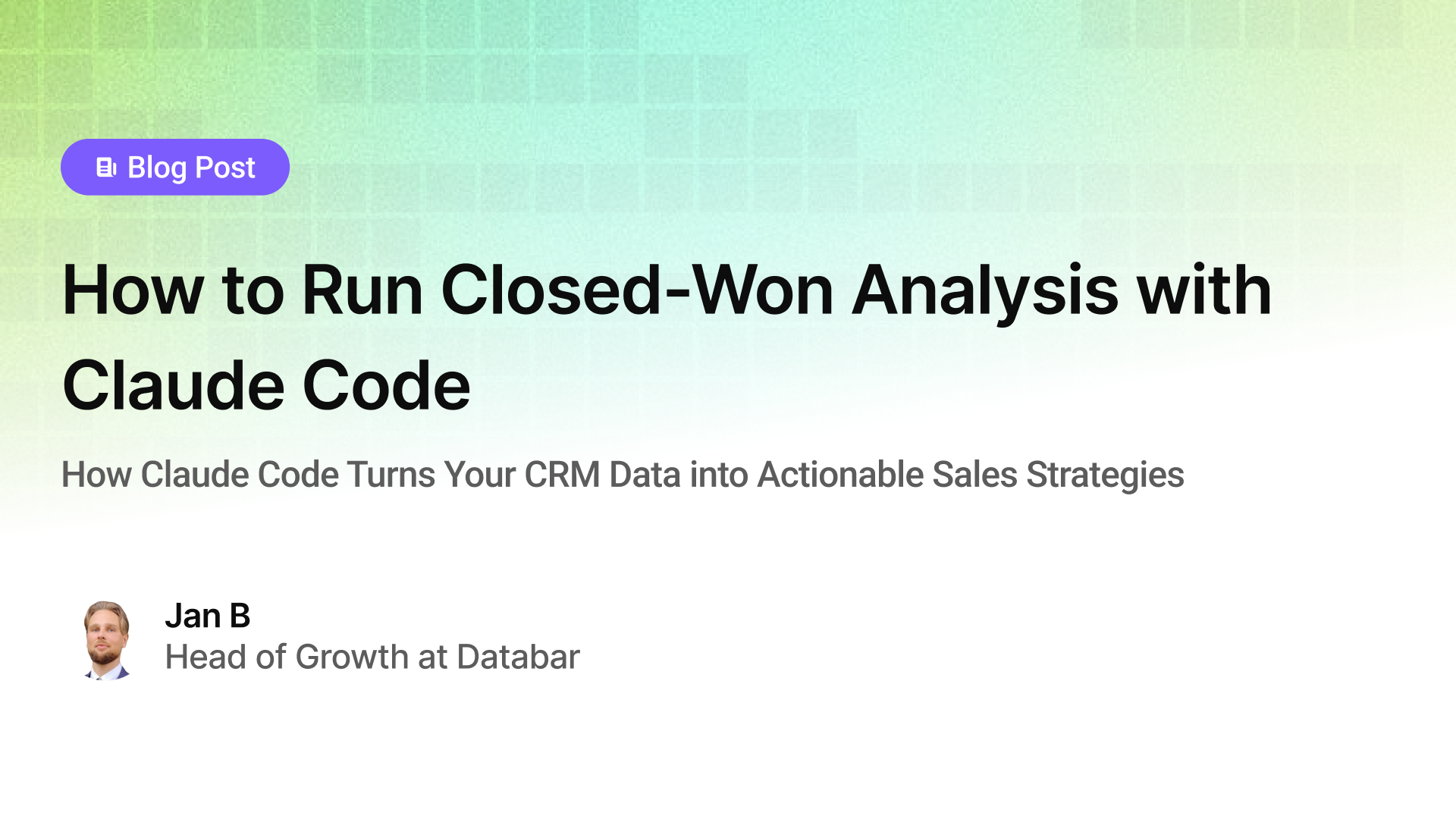
How to Run Closed-Won Analysis with Claude Code
How Claude Code Turns Your CRM Data into Actionable Sales Strategies
by Jan, February 21, 2026
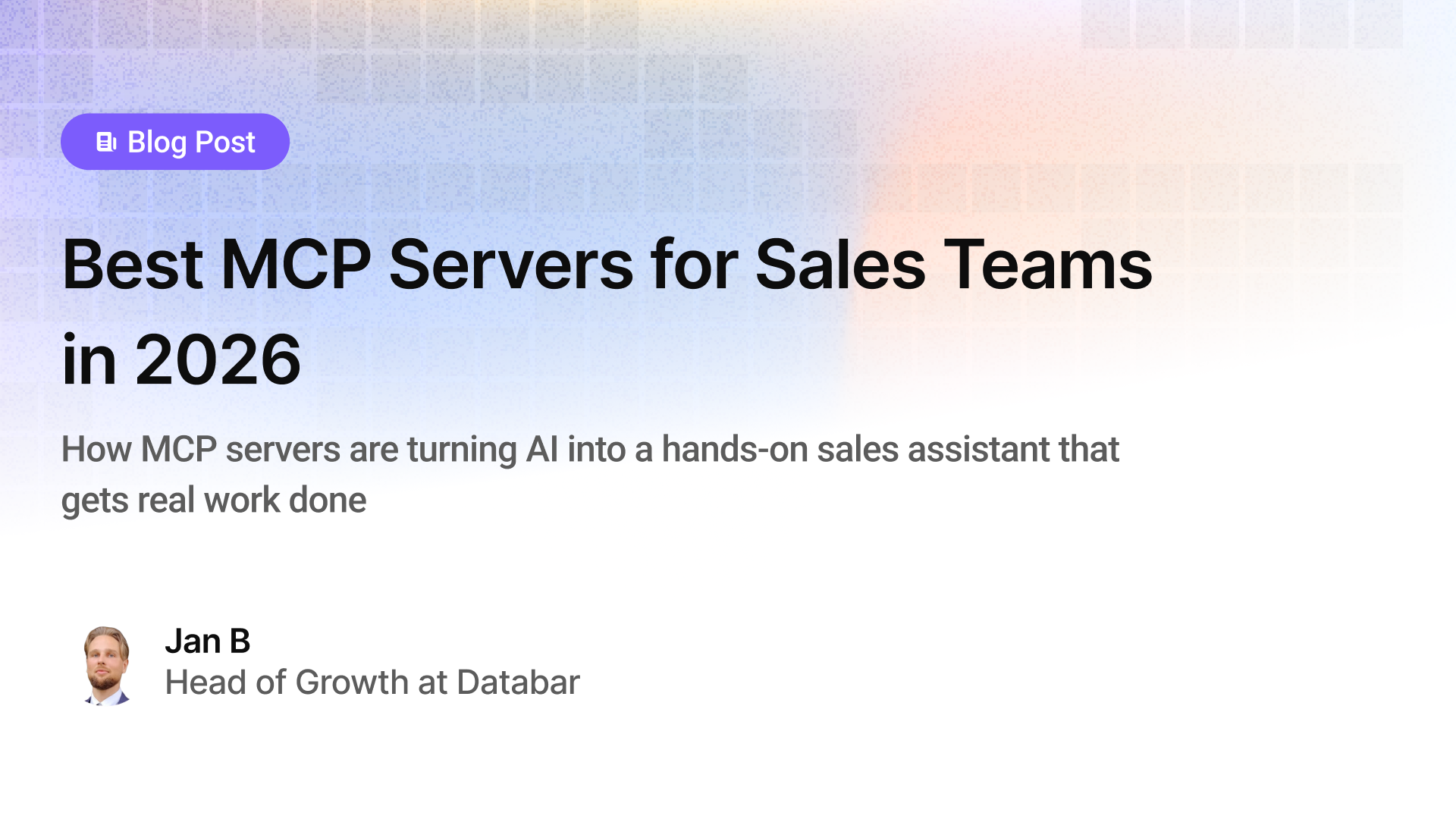
Best MCP Servers for Sales Teams in 2026
How MCP servers are turning AI into a hands-on sales assistant that gets real work done
by Jan, February 20, 2026
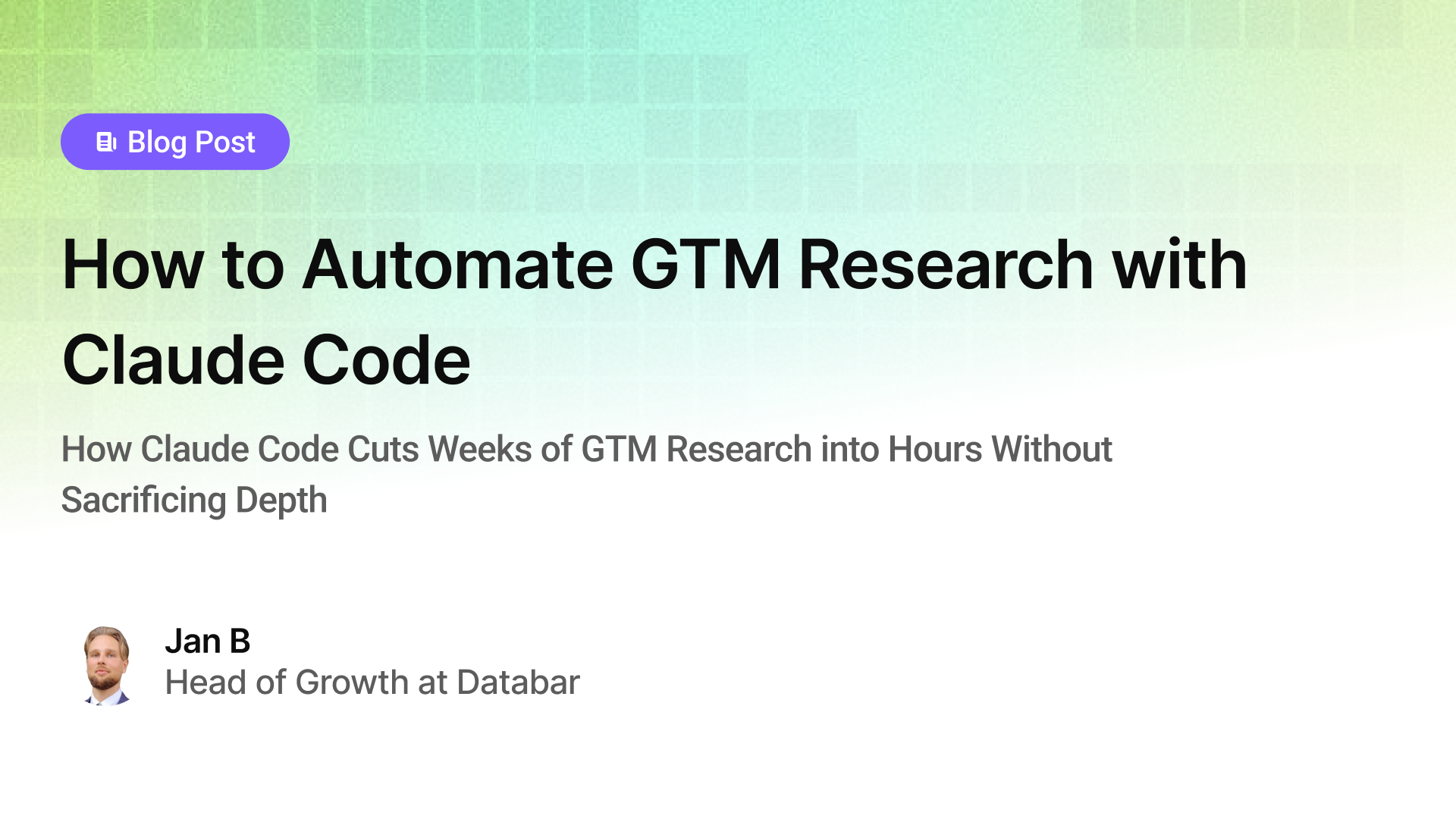
How to Automate GTM Research with Claude Code
How Claude Code Cuts Weeks of GTM Research into Hours Without Sacrificing Depth
by Jan, February 20, 2026
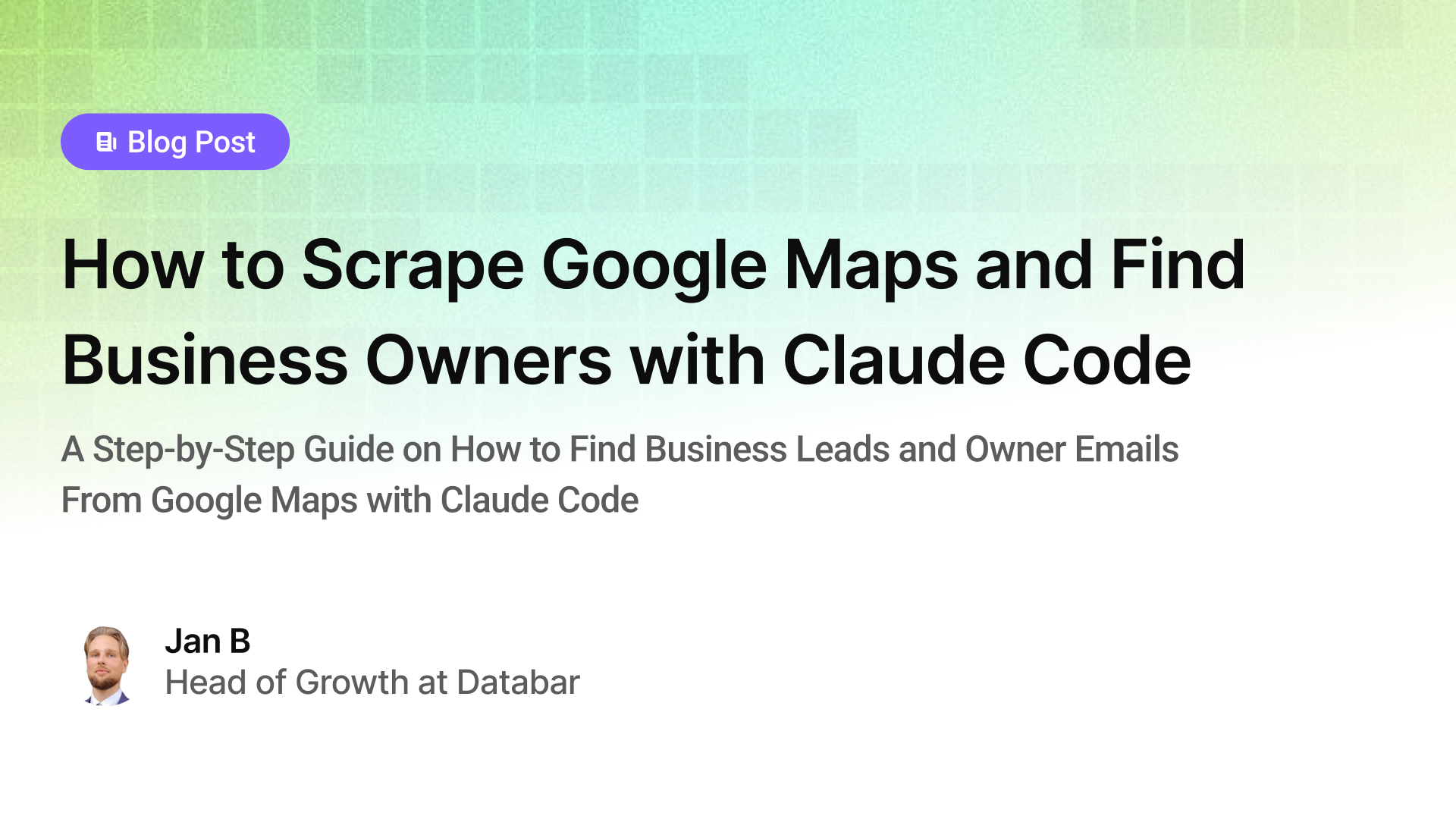
How to Scrape Google Maps and Find Business Owners with Claude Code
A Step-by-Step Guide on How to Find Business Leads and Owner Emails From Google Maps with Claude Code
by Jan, February 19, 2026

